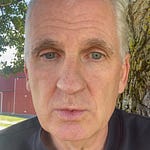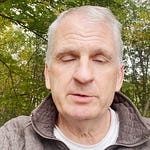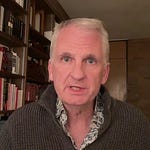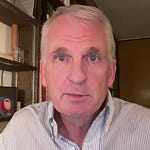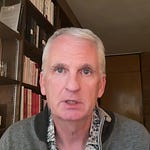I thought this piece on our media religion, which I meant entirely seriously but which I hope is also fun, might be a useful preparation for the media this weekend and in weeks to come. This is the podcast version of a written post from July. I paste the text in below; what is new is the podcast. You receive it as a subscriber, but you are welcome to share it.
Why does American television and press “both-sides” our politics? Why are such different presidential candidates presented as equally flawed? Why do the outrages of Trump, for example at the Republican National Convention in Milwaukee, lead to the humiliation of Biden?
Both-Sidesism is the habit of reducing the world into two perspectives, treating the two as fundamentally alike, and then ignoring or adjusting the data. One cause of this odd behavior is the ownership of media companies. Another is fear.
But Both-Sidesism is not just a practice. It passes in the United States for a principle of journalism. Indeed, the dualism is almost unquestionable. Americans tends to take it for granted.
But it makes no sense. No data from the world around us indicates that two is the correct number of perspectives, nor that any two perspectives, once chosen, would be equal.
These are, rather, articles of faith. Once accepted, they enable the public performance we wrongly call “media.” Both-Sideism does not mediate but mystify. Its practitioners, called “anchors” or “publishers,” are shamans or priests. Mystifiers.
To be sure, “media” people do not think that they are mystifying. Nor are we in the habit of seeing them as practicing a religion.
But let us step back. Let us consider, for the sake of argument, that Both-Sidesism might be a dualist cult. Let us place its beliefs and practices in the context of the history of religion, and see what happens.
The number two has helped humans make sense of the world, from distant times to the present. It has had a powerful sway over human minds.
The number two can address the mystery of creation. In Indo-European societies, the universe sometimes began as a coupling of two entities, for example the Earth and the Sky. Or the first Being could be of two sexes, or twinned. In several myths, twin gods ride to the rescue of early humans in peril.
Duality can also help humans to frame the problem of evil, as in Manicheanism. Its founder Mani (enlightened by a spiritual twin) claimed that the universe was divided into darkness and light. Human action is then understood as struggle between these two forces.
The number two can also help us handle time. The Romans had a two-faced god, Janus, who was in charge of doors, passages, and thus transitions in general, beginnings and endings. He is very much present with us at the beginning of each year; January is named for him.
In Daoism we find something of all of the above in the notion of yin-yang: dark and light, chthonic and lively, female and male, wet and dry, which constantly join and give way to one another. Their interaction brings the world into being, and also enables natural and guides human action.
Both-Sidesism is another dualism. When confronting a phenomenon, for example an election or a party convention, the acolytes of Both Sides perform two steps. They reduce events to two personalities, then treat them as equal aspects of the two-headed divinity known as Both Sides.
Again: that there only two sides, and that the two aspects are the same, are unspoken articles of faith.
Once this initial ritual has been performed, the task of the priesthood is to sense disturbances that disrupt the apparent equality of the two aspects of Both Sides. The mythic utterances of the priests of Both Sides – bad journalism -- resolve the cultic tension that appears when a difference between the two aspects emerges.
Equality is restored in a peculiar way, one that emphasizes the sacred character of the dual god, at the expense of understanding reality. The priests cannot undo the deeds of one aspect of Both Sides – for example a coup attempt or a call to deport millions. And if they described it accurately, they would only be deepening the mystical inequality between Both Sides’ two aspects. They must normalize.
Our Both-Sides priests correct the mystical imbalance with two mantric maneuvers. The first is to proclaim, groundlessly, that the perpetrator of the crime has learned his lesson, executed a pivot, turned a corner. The second is to humiliate the other side, the one that did nothing. And thus the mystical equilibrium between the two aspects of Both Sides is restored.
This normalization has consequences. If one of the two aspects of Both Sides seems to have done a great evil, the priests of Both Sides always ritually vituperate the other side. The price of the restoration of mystical equality is the rehabilitation of the criminal and the degradation of the blameless.
Our media people do not see it this way, of course. The restoration of the mystical equilibrium of Both Sides brings our priests a pious satisfaction, visible on the red faces of correspondents in Milwaukee this last week.
If pressed, the shamans of Both Sides insists that their dualistic dances are nothing other than correct method to describe the universe. The cult and its performance is protected from critique by the totemic terms “objectivity” and “balance.”
All shamans do this: they insist that their dogma must be our reality. But when we allow the cult of Both Sides to shape our own minds, ethical judgement and factual investigation disappear, and with them any chance for constitutional order and democracy.
Ethical judgement would involve a notion of right and wrong, which the activity of the priests erodes. The worse the evil of one side, the more artfully it must be forgiven, and the more viciously the other side must be berated. Believers in the cult of Both Sides experience this as moral action, whereas in fact the performative relativism erodes all morality.
Factual investigation would involve identifying other perspectives which the cult of Both Sides disregards. It would necessitate separating the two aspects Both Sides from each other and confronting their words with the facts of the world. To believers in the cult of Both Sides, it is a relief clothed in righteousness never to have to perform such labor.
Earlier dualistic faiths were no more outlandish than our own cult of Both Sides. Indeed, they had something to say about foundational issues. The Indo-European, Near Eastern and East Asian beliefs, to which I briefly referred above, generated stories about the world that inspired philosophy and science. The cult of Both Sides is the dogmatic distraction from the bloody sacrifice of a republic.
PS I want to be clear: this essay concerns the dominant both-sides ritual in the American “media,” and not the work of actual investigative journalists, who follow very different methods, and whose work stands at the basis of what we now about Trump’s ongoing attempt at regime change. I dedicated Road to Unfreedom to reporters as “the heroes of our time.” They are.






